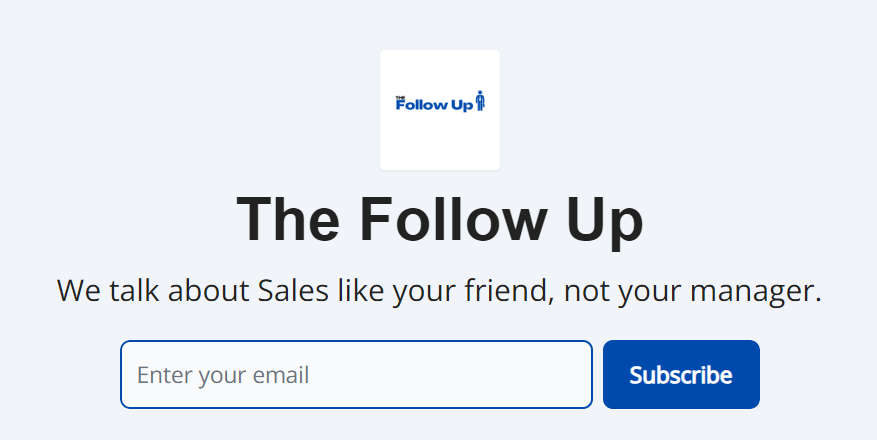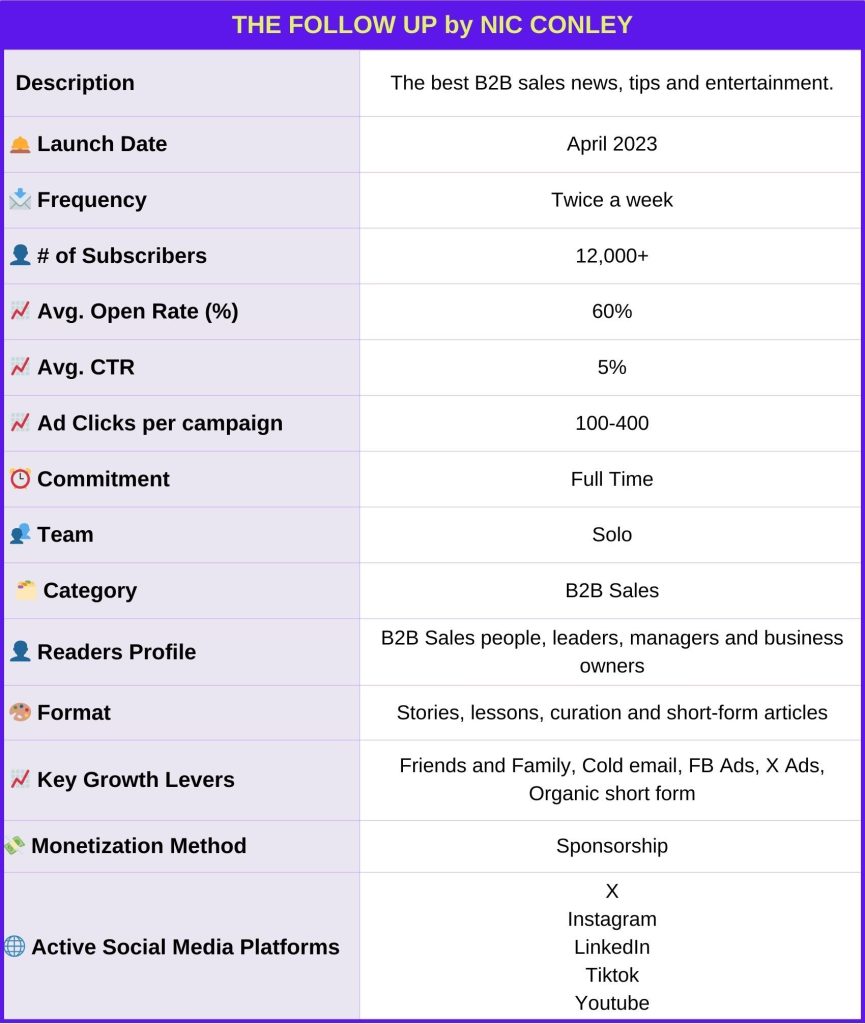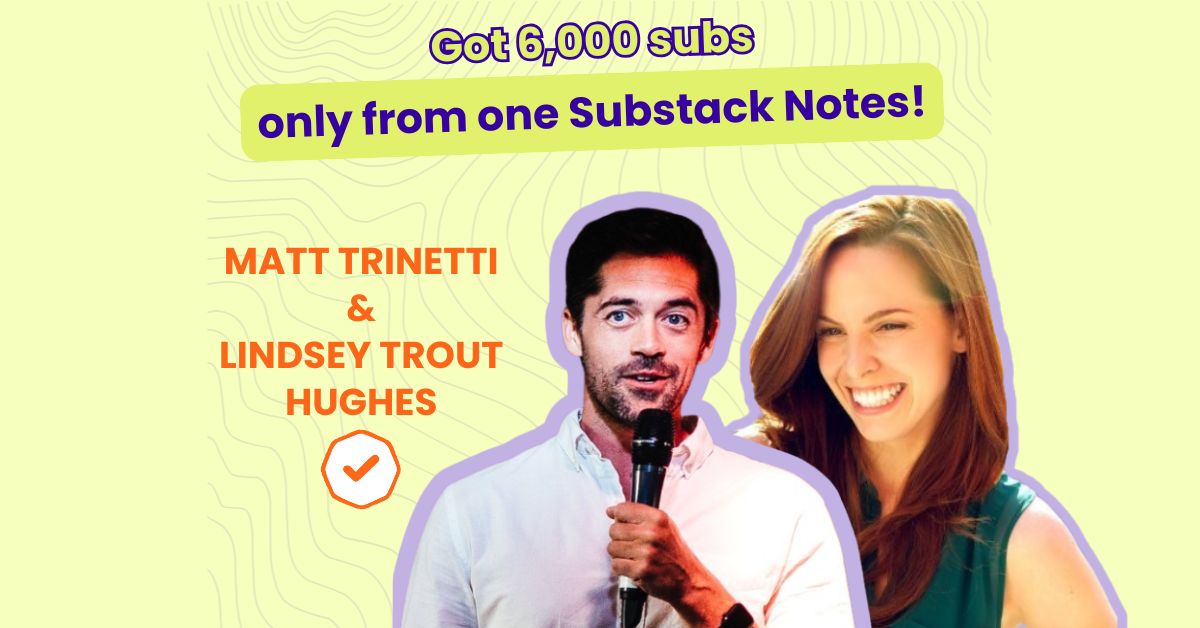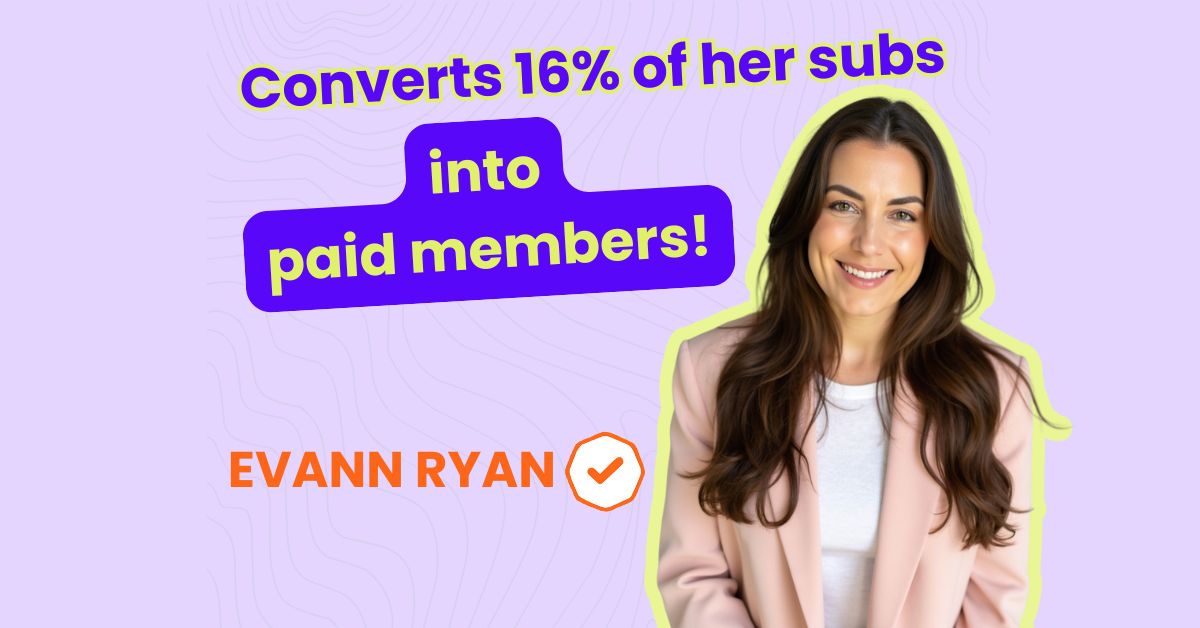Interview Date: January 29, 2024
Table of Content
CREATOR INTERVIEW

If you’re one of the long-time readers of Newsletter Circle, you might recall that I have ten years of background in corporate life. I quit in search of a more meaningful way to build a career on my own terms but it took me almost two years to discover newsletters and decided to start a business out of it.
On the other hand, today’s guest, Nic Conley, has had a robust strategy since the beginning.
He started his newsletter as a side hustle and once he saw enough proof of its potential, he made the real jump. He left his job at Amazon in November 2023 to fully focus on building The Follow Up, his twice-weekly B2B Sales newsletter reaching 12K subscribers.
Nic has utilized various growth strategies so far and continue to experiment. Currently, he is mainly focusing on organic growth from Instagram and YouTube while being bullish on paid ads and SEO.
He’s confident about the content he creates and ambitious about reaching 50K subscribers in 2024.
“Will it work out? Nothing’s certain… but I think so. And I’d rather live with the regret of trying, than never taking the risk.”
It’s time to learn how Nic Conley has been successfully building his newsletter business and get some inspiration.
Let’s dive in!
NEWSLETTER IDENTITY CARD

TOOL STACK
- ESP → Beehiiv*
- Writing → Google Docs, Apple Notes and Beehiiv*
- Planning & Task Management → Google Docs
- SEO → Beehiiv*, Google Search Console
- Design → Canva
- Team Communication → Slack
- Sponsorship → Passionfroot
- Podcast recording → Riverside
- Record talking head shorts and edit down podcast clips → Descript
- Video editing → FinalCut or Capcut
MEET THE CREATOR
Welcome Nic. Let’s start with getting to know you.
My name is Nic Conley. I do it without a K because I couldn’t write a “K” when I was younger., and my grandma told me I didn’t need it. (:
I’ve had side hustles like shoveling driveways, flipping Jordans, and selling snapback hats in high school, and I got into tech sales as soon as I graduated from West Virginia University.
I sold HR software at two different companies and then joined a very small startup that did nationwide drone services called Dronegenuity (when I say small, I mean the founder was my boss, and there were months when I was the only other FTE).
Looking back, this experience was incredible. I got an inside look at what it took to build a 7-figure bootstrapped company.
After that, I landed a job working on the international e-commerce markets team at Amazon, where I helped some of the largest US 3rd party Amazon Sellers launch into Amazon MX.
“After 2.5 years at Amazon, I decided to make the jump to building my own business (The Follow Up) full-time.“
During my entire time working for other companies, I was also working on a bunch of different side hustles.
I started writing “3 Ideas on Sunday” in 2021 and have posted every Sunday for the last 3 years.
I also started Subshark.io (a newsletter referral tool for Substack), and sold it in early 2023.
START
How did you decide to start The Follow Up newsletter in the first place?
I’ve been obsessed with newsletters ever since I started writing 3 Ideas on Sunday in 2021.
Then, in early 2023, I met Billy from the Milk Road on Twitter, and we hit it off pretty quickly.
We’d throw all sorts of business ideas at each other, but I kept having this idea for a B2B sales newsletter.
“I saw a big opportunity because B2B sales is a very lucrative niche, and all of the current newsletters I could find were pretty bad. I wanted to bring real stories, news, and insights from the perspective and language of a sales rep. Written like barstool sports, not an academic paper. “
So, after a few nights of brainstorming, Billy and I decided to start The Follow-Up.
What were the biggest advantages of starting a newsletter with a co-founder?
If you’re both good at content, it’s awesome to have a partner to brainstorm and bounce ideas off of. In the beginning, we both worked on the “main story” together.
Today, I’m running things solo.
At the end of November, you quit your 6-figure job at Amazon to be all in on The Follow Up newsletter. As someone who’s been on the same path, I know that it’s a difficult yet quite exciting decision.
Last week I officially quit my 6-figure job at Amazon.
— Nic Conley (@niconley) November 28, 2023
After 2.5+ years, it was time to make the leap.
If I told you it was an easy decision I'd be lying. It's extremely scary, and exciting at the same time.
No more paycheck or no more health insurance.
But now I'm all in… pic.twitter.com/RTmsoMsE85
What kind of perspective change made you give this decision?
I just turned 29, so 30 is staring me straight in the face.
I’ve always known I was going to run my own business, but I have also been too afraid to make the actual jump and never felt like I had “the right idea.”
Right now, I don’t have a primary mortgage or kids, but I figure that is likely to change in the next few years.
“So, I really just hit a “now or never” moment.
My biggest fear is a regret of not trying. Like, what’s the worst that could happen?”
I always joke that I might end up homeless if it doesn’t work out, but I think I could land another job before that happens, haha.
How was your experience with the first couple of months since resigning?
It’s awesome to control my day and focus on exactly what I want to do without checking my phone for a ping from my boss.
But on the other hand, I go to sleep every night knowing that I didn’t get a normal paycheck that day.
“I’d be lying if I said I don’t have panic moments here and there. It’s kind of scary, but I try not to think too deeply about it.”
GROWTH
How did you gain your first 1,000 subscribers?
Like most people say, my first 100 or so subscribers were directly from hand-to-hand combat.
I texted my family, friends, and old co-workers and asked if I could add them to the newsletter.
From there, I actually used cold email (in true B2B sales fashion). I learned this from my friend Alex Breen, who cold-emailed a ton of real estate investors to grow one of his email lists to 1000’s of subscribers.
I’d go on Apollo.io, scrape a bunch of emails for Business Development Reps, and basically ask them to subscribe (or if I could subscribe to them).
This probably got me to 500+, but I had also experimented with FB ads for another newsletter, so I started using them pretty quickly.
Which strategies did you use to grow over 10,000 subscribers?
0 – 1,000 subscribers
Friends, family, coworkers + cold email until 500.
500+ I added in Facebook ads, but was able to recover almost 100% of the ad spend with Sparkloop Upscribe. This was before newsletters could put super strict requirements on the subscribers they’d accept, so it was like free growth. The good old days.
1,000 – 7,000 subscribers
Facebook + Twitter Ads.
I believe this was right around the time that Elon took over Twitter, and the ad rates were insane for a few months. I was able to get a subscriber through a Twitter ad for .30 – .70 cents and also offset that with Sparkloop. This only lasted a month or two, but it was beautiful. These days, I’ve stopped running Twitter ads because they’re inconsistent and average $2-$4 for a subscriber.
7,000 – 10,000
After shutting down Twitter ads, I’ve mainly focused on Facebook ads.
They’re reliable and we can get a very good CPA.
10,000 – present
We continue to use Facebook ads + Sparkloop upscribe, but we’re also starting to see good results with Instagram organic.
I make a point of posting almost every single day (sometimes multiple times a day), and it’s working.
“If I were starting over and trying to grow strictly through organic social, I’d go with Instagram.
Reels are super shareable, and people tend to check out your profile page more than any other platform.“
We’re also starting to see SEO kick in with around 30-50 clicks per day, which results in 1-5 new subscribers a day. It’s still very early, but I’m bullish on growing with SEO.
Lastly, I’m focused on more organic videos.
I’ve started interviewing well-known people in the sales world and posting them on YouTube and LinkedIn.
Which growth channels are the most effective ones?
Organic Instagram and YouTube are my biggest focuses for this year.
I’ll always have paid ads turned on, but in order to hit the numbers I want to, I’m making a big push for organic video.
You’re active on many social media platforms, including Twitter, LinkedIn, Youtube, Instagram and TikTok.
What is your strategy to manage consistency and growth on multiple platforms at the same time?
I actually wouldn’t recommend someone try to grow on all platforms at once because it divides your focus.
However, I enjoy making videos for Youtube, which can then be posted on LinkedIn, Instagram, TikTok, etc.
“If the content is already made (like a short-form video), I think you might as well post it on every platform that will take it.
I’ll have videos that bomb on Youtube Shorts but take off on TikTok.
So, increase your odds.“
What are your biggest learnings so far regarding turning social media followers into newsletter subscribers?
“I just make sure to mention the newsletter in all of the content, and make it super easy for them to subscribe.
Tell them exactly where to go or where to find the link.
If you don’t mention it, they won’t know.“
I strictly use Twitter to connect with other people in the business world, so I don’t have any great tips on turning Twitter Followers into Subscribers.
ENGAGEMENT
How do you manage to keep your open rates at around 60%?
I am constantly cleaning the list.
Although it’s painful, I’ve deleted 1000’s of subscribers that don’t open our emails. It sucks, but you’ve gotta do it.
I also try my best to listen to feedback from subscribers via the poll at the bottom of the email.
If we send out a story that I think is great, but every vote says it wasn’t, I use that feedback to form an idea of what resonates best with our subscribers.
MONETIZATION
Can you take us through your sponsorship strategy? (see here)
When did you start it?
I believe we started around the 5K subscriber mark.
I wanted to wait until I knew we could provide a ton of value to advertisers.
How do you decide on ad pricing?
For the most part, we go off of CPMs for email opens.
A CPM is basically the cost per 1,000 opens. I see a lot of people count their entire list in this pricing, but that’s deceiving. If you have 20K subscribers but only a 40% open rate, you should only be charging a CPM on those 8K opens you’re getting.
“So, we use a comparable B2B CPM based on the number of opens we get on average. Front there I discount bigger buys.
I also like to think about the cost-per-click in the back of my mind to make sure the advertisers are getting a good deal with their ad dollars.”
How do you find sponsors and manage the process?
So far, our biggest ad deals have come inbound and have been awesome partners. Every once in a while, we’ll also run a CPC campaign with something like the Beehiiv ad network, but this is not ideal because the ads and copy don’t always align the best with our audience.
What are your key learnings about building strong partnerships?
At the end of the day, you need to perform.
Always follow up after the ad runs, good or bad. If it performed well, let them know what you saw from your end. If it flopped, tell them the numbers and what you think could be done differently in the future.
PERFORMANCE TRACKING
What are the key metrics that you follow? Do you have any objectives for 2024?
Like most newsletters, we track list size, open rates, CTR, cost-per-subscriber, and total revenue.
My biggest goal for 2024 is to hit 50K subscribers.
Obviously, CTR and open rates are extremely important, but at the end of the day, you need a big list size to get the attention of larger advertisers.
E-MAIL SERVICE PROVIDER
Why did you choose Beehiiv? Pros and cons?
I think Beehiiv* just hands down has the best features for the best price. I used Substack for 2+ years, and Beehiiv is a 10X platform in terms of building a real newsletter business.
“If you’re just looking for a free place to write and build a list slowly, I actually don’t think Substack is a bad place for that.
But if you were scale and the tools needed for scale, Beehiiv* is great.”
NEWSLETTER EXPERIENCE
How did building The Follow Up contribute to your life professionally and personally?
It has been awesome for connecting with interested people doing cool stuff.
I think the best/only way to connect with other interesting people is to do interesting things yourself.
“Also, the podcast has been an amazing networking hack.
If you want to connect with someone, they’re much more likely to agree to come on a podcast vs connecting for a 5-minute call.”
And with the podcast, you get good content, and they (hopefully) get more exposure.
What is the most challenging part of operating a newsletter and how do you handle it?
I’d actually say there are three big categories.
The first is content. Unlike finance, crypto, or marketing, there’s no news about B2B sales coming out every day. Also, there are only so many posts you can make about the best ways to cold call and cold email. Finding an interesting story is tough, but I think that’s what makes our content special.
The second is growth. Like everyone, I want to grow bigger, faster. There’s really no silver bullet to this. Just stay the course and keep pushing.
The third is monetizing. Sponsors are great, but you constantly have to work on getting new ones, and that’s sort of a full-time sales job itself. I’d love to find another source of revenue, I just haven’t figured out the perfect product/service yet.
LEARNINGS
What would it be if you had the right to give one piece of advice to aspiring newsletter creators?
It all starts with the content.
“Find a topic or angle that you can do better or different from everyone else. We don’t need any more AI or marketing newsletters that just cover news articles.
However, if you can make content that’s completely different from what everyone else is doing around those topics, you might have something.”
I started The Follow Up because I couldn’t find anyone covering B2B sales in the way that The Hustle covers tech or Barstool covers sports & the internet.
There are tons of “sales trainers” that put out the same fluffy sales advice in a newsletter, but none of them are actually talking about real stories. That was my angle.
If you had a chance to start over The Follow-Up, what would you do differently?
“I think I would’ve started investing more time and attention into organic growth like Instagram early on.“
I’d also plow way more money into Twitter ads when they were showing crazy results, but unfortunately, that ship has sailed… haha
It’s still super early, so I’m sure that I’m making mistakes right now that I’’ll look back on in a year, but for now, I’m just heading down doing what I can.
FAVORITE NEWSLETTERS
What are your favorite newsletters that you can’t wait for the next issue?
I know this sounds bad, but I actually don’t read a ton of other newsletters, lol. I think it’s the same with how a lot of Youtubers don’t watch a ton of other YouTube videos.
I think Matt McGarry, Cole Bridge, Dan Barry, and yourself, write really cool ones for anyone interested in growing a newsletter.
I’m sure there’s ones that I read on a regular basis, I’m just blanking on them right now.
FINAL WORDS
Thanks for having me on! I hope I shared enough to make this interesting or valuable to others interested in newsletters.
Where to find Nic Conley and his work
3 Popular Issues from The Follow Up
- From CEO Back to SDR: The story of a 7-figure CEO turned BDR
- Are Extroverts Good Salespeople: Why extroverts are the first pick for sale people
- Layoffs & Viral Videos: A sales rep went viral for getting fired and the CEO’s response
*indicates affiliate links


